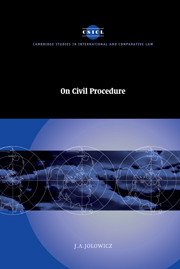Book contents
- Frontmatter
- Contents
- Preface
- List of abbreviations
- Introduction
- I The litigation process
- II Protection of diffuse, fragmented and collective interests
- III Procedural modes
- IV The parties and the judge
- 10 Da mihi factum dabo tibijus: a problem of demarcation in English and French law
- 11 Fact-finding
- 12 The expert, the witness and the judge in civil litigation: French and English law
- 13 The use by the judge of his own knowledge (of fact or law or both) in the formation of his decision
- V Recourse against judgments
- VI Procedural reform
- Index
- CAMBRIDGE STUIDES IN INTERNATIONAL AND COMPARATIVE LAW
13 - The use by the judge of his own knowledge (of fact or law or both) in the formation of his decision
from IV - The parties and the judge
Published online by Cambridge University Press: 18 December 2009
- Frontmatter
- Contents
- Preface
- List of abbreviations
- Introduction
- I The litigation process
- II Protection of diffuse, fragmented and collective interests
- III Procedural modes
- IV The parties and the judge
- 10 Da mihi factum dabo tibijus: a problem of demarcation in English and French law
- 11 Fact-finding
- 12 The expert, the witness and the judge in civil litigation: French and English law
- 13 The use by the judge of his own knowledge (of fact or law or both) in the formation of his decision
- V Recourse against judgments
- VI Procedural reform
- Index
- CAMBRIDGE STUIDES IN INTERNATIONAL AND COMPARATIVE LAW
Summary
The subject matter of this chapter lies at the heart of the judicial process, and, perhaps for that reason, is one to which the rules of positive law seldom refer in explicit terms. It is more intractable than many: in the last resort it is concerned with the mental processes of the judge himself, and those processes cannot ordinarily be known save to the extent that the judge is willing to disclose them in his exposition of the reasons for his decision or in the course of the proceedings leading up to his decision. Nor is it possible rigidly and accurately to enforce such rules as there may be which purport to restrict use by the judge of knowledge that he happens to have: only an Orwellian ‘Thought Police’ equipped with futuristic ‘thought detection’ devices could do that. For the time being, only two means of control exist - a judge possessed of knowledge of which he cannot make legitimate use in a given case can be disqualified, and a decision which is seen to be based in part on such knowledge can be set aside by a court of appeal or cassation.
The inadequacy of these controls is shown in the report for France.
- Type
- Chapter
- Information
- On Civil Procedure , pp. 243 - 268Publisher: Cambridge University PressPrint publication year: 2000

